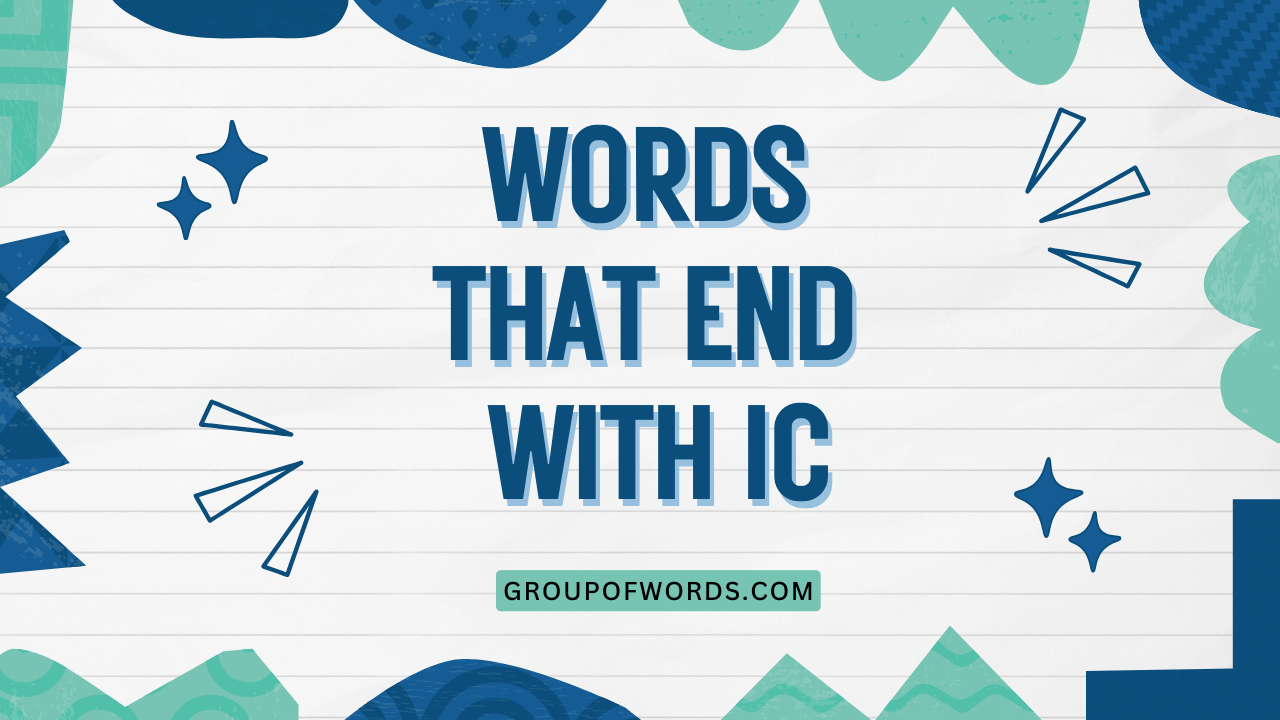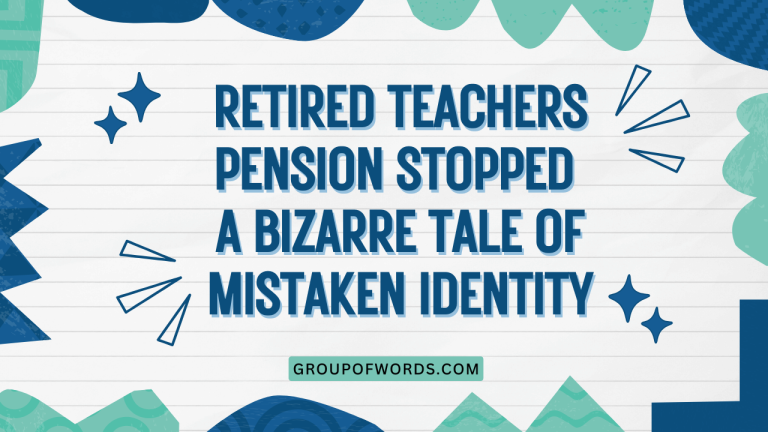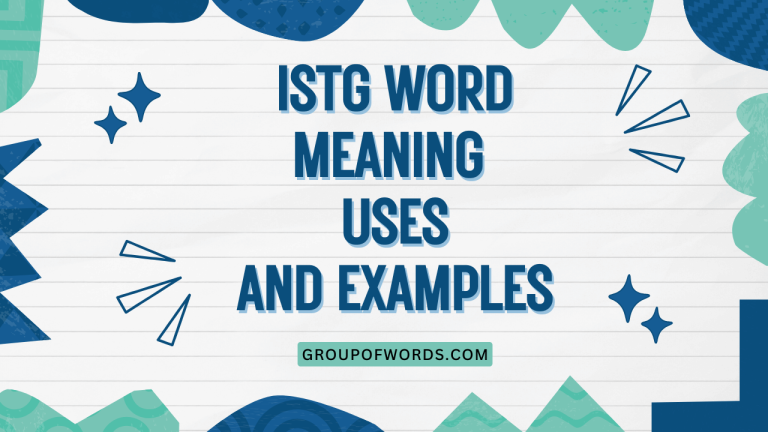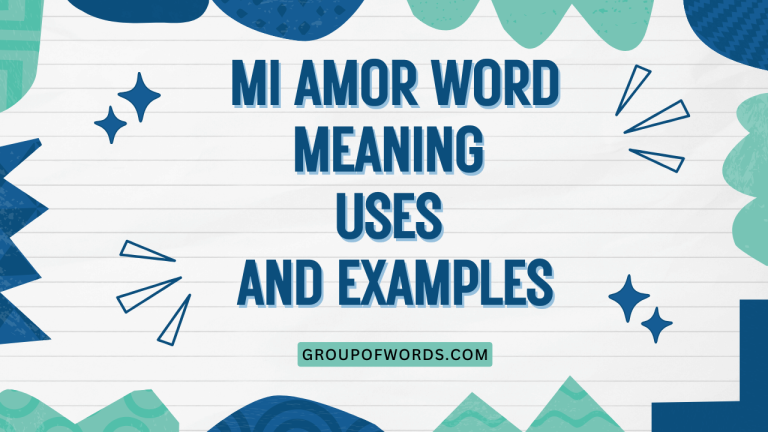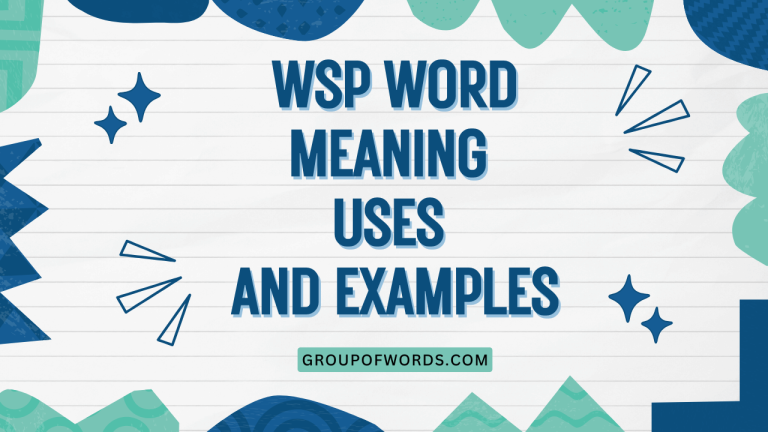Words Ending in ‘ic’: A Comprehensive Grammar Guide
Words ending in ‘-ic’ are a common feature of the English language, playing diverse roles as adjectives and nouns. Understanding their formation, usage, and grammatical function is crucial for clear and effective communication.
This article offers an in-depth exploration of these words, covering their definitions, structural patterns, usage rules, common mistakes, and practical exercises. Whether you are an English language learner or a seasoned writer, this guide will enhance your grasp of words ending in ‘-ic’ and improve your overall language proficiency.
Table of Contents
- Introduction
- Definition of Words Ending in ‘-ic’
- Structural Breakdown
- Types and Categories
- Examples of Words Ending in ‘-ic’
- Usage Rules
- Common Mistakes
- Practice Exercises
- Advanced Topics
- FAQ
- Conclusion
Definition of Words Ending in ‘-ic’
Words ending in ‘-ic’ are a group of words in English that primarily function as adjectives, but can also appear as nouns. The suffix ‘-ic’ generally indicates a relationship to, or characteristic of, the root word it is attached to.
For example, the word “heroic” (ending in -ic) means “characteristic of a hero” or “relating to a hero.” The suffix often transforms a noun into an adjective, describing something’s quality or nature.
As nouns, words ending in ‘-ic’ often refer to a field of study or a specific type of substance or concept. For instance, “critic” refers to a person who analyzes and judges something (like art or literature), and “arsenic” is a chemical element.
The grammatical function of words ending in ‘-ic’ depends on the context in which they are used. As adjectives, they modify nouns, providing additional information about them.
As nouns, they can act as subjects, objects, or complements within a sentence. Understanding this dual role is essential for correct usage.
Structural Breakdown
The structure of words ending in ‘-ic’ typically involves a root word (often a noun or verb) to which the suffix ‘-ic’ is added. This suffix alters the grammatical category and meaning of the base word.
Consider the word “poet.” By adding ‘-ic’, we get “poetic,” which transforms the noun into an adjective meaning “characteristic of poetry” or “relating to poetry.”
The addition of ‘-ic’ can sometimes necessitate slight spelling adjustments to the root word. For example, “economy” becomes “economic,” where the ‘y’ is changed to ‘i’ before adding the suffix.
These adjustments are usually predictable based on established spelling rules.
It’s important to note that some words ending in “-ic” have evolved over time, and their etymological roots may not always be immediately obvious. In some cases, the connection between the root and the derived form is historical rather than transparent in modern usage.
Despite these exceptions, the general principle of a root word combined with the ‘-ic’ suffix remains a useful framework for understanding the structure of these words.
Types and Categories
Adjectives
The most common function of words ending in ‘-ic’ is as adjectives. These adjectives describe qualities, characteristics, or relationships.
They modify nouns, providing additional information about them. For example, in the phrase “a volcanic eruption,” the adjective “volcanic” describes the type of eruption.
These adjectives can be used in both attributive and predicative positions. In the attributive position, the adjective comes before the noun it modifies (e.g., “a historic event”).
In the predicative position, the adjective follows a linking verb (e.g., “The event was historic”).
Nouns
While less frequent, words ending in ‘-ic’ can also function as nouns. These nouns often refer to a person associated with a particular activity or field, a substance, or a concept.
“Critic,” “cynic,” and “lunatic” are examples of nouns ending in ‘-ic’ that denote people with specific characteristics or roles. “Arsenic,” “nitric,” and “sulfuric” are nouns that refer to chemical substances.
The context in which a word ending in ‘-ic’ is used determines whether it functions as an adjective or a noun. For example, “classic” can be an adjective (e.g., “a classic car”) or a noun (e.g., “a classic of literature”).
Recognizing this distinction is crucial for accurate interpretation and usage.
Examples of Words Ending in ‘-ic’
Adjective Examples
The following table provides a range of examples of adjectives ending in ‘-ic’, illustrating their diverse meanings and usage.
| Adjective | Meaning |
|---|---|
| Academic | Relating to education and scholarship |
| Achromatic | Without color |
| Acoustic | Relating to sound or hearing |
| Aerobic | Relating to or requiring oxygen |
| Alcoholic | Containing alcohol or relating to alcoholism |
| Allergic | Relating to an allergy |
| Analytic | Using analysis or logical reasoning |
| Anatomic | Relating to the structure of the body |
| Apathetic | Showing or feeling no interest, enthusiasm, or concern |
| Aquatic | Relating to water |
| Archaic | Very old or old-fashioned |
| Artistic | Having or revealing creative skill |
| Athletic | Physically strong, fit, and active |
| Atomic | Relating to atoms or atomic energy |
| Autocratic | Relating to a ruler with absolute power |
| Ballistic | Relating to projectiles and their motion |
| Barbaric | Savagely violent; exceedingly brutal |
| Biographic | Relating to someone’s life story |
| Botanic | Relating to plants |
| Bureaucratic | Relating to a system of government with many rules and procedures |
| Caloric | Relating to heat or calories |
| Cardiac | Relating to the heart |
| Chaotic | In a state of complete confusion and disorder |
| Chronic | Persisting for a long time or constantly recurring |
| Civic | Relating to a city or town, especially its administration |
| Climactic | Relating to a climax or the most intense part of something |
| Comic | Causing amusement; funny |
| Cosmic | Relating to the universe or cosmos |
Noun Examples
The following table provides various examples of nouns ending in ‘-ic’, highlighting their different meanings and uses.
| Noun | Meaning |
|---|---|
| Arsenic | A poisonous chemical element |
| Critic | A person who expresses an unfavorable opinion of something |
| Cynic | A person who believes that people are motivated purely by self-interest |
| Heretic | A person believing in or practicing religious heresy |
| Lunatic | A mentally ill person (dated term) |
| Mechanic | A person who repairs and maintains machinery |
| Rhetoric | The art of effective or persuasive speaking or writing |
| Stoic | A person who can endure pain or hardship without showing their feelings or complaining |
| Arithmetic | The branch of mathematics dealing with numbers and their operations |
| Logic | Reasoning conducted or assessed according to principles of validity |
| Music | Vocal or instrumental sounds (or both) combined in such a way as to produce beauty of form, harmony, and expression of emotion |
| Almanac | An annual calendar containing important dates and statistical information such as astronomical data and tide tables |
| Clinic | A place where outpatients receive medical treatment or advice, especially of a specialist nature |
| Garlic | A strong-smelling pungent-tasting bulb, used as a flavoring in cooking and in herbal medicine |
| Mimic | A person skilled at imitating others, especially for entertainment |
| Picnic | An outing or meal taken al fresco (outside) as part of an excursion, especially in summer |
| Traffic | Vehicles moving on a road or public highway |
| Topic | A subject dealt with in a discussion or piece of writing; a theme or subject |
| Brick | A rectangular block of baked earth, used for building walls, pavements, and other structures |
| Candlestick | An object for holding a candle |
| Emetic | A medicine or agent that causes vomiting |
| Fabric | Cloth or other material woven or knitted from yarn |
| Magic | The power of apparently influencing the course of events by using mysterious or supernatural forces |
Examples in Sentences
This table provides examples of how words ending in ‘-ic’ are used in sentences, demonstrating their varied roles and functions.
| Sentence | Word Ending in ‘-ic’ | Part of Speech |
|---|---|---|
| The historic building was carefully preserved. | Historic | Adjective |
| She is a harsh critic of modern art. | Critic | Noun |
| His behavior was erratic and almost manic. | Manic | Adjective |
| The scientist studied the effects of arsenic. | Arsenic | Noun |
| The oceanic currents affect the climate. | Oceanic | Adjective |
| He approached the problem with a systematic method. | Systematic | Adjective |
| She has a very cynical view of the world. | Cynical | Adjective |
| The doctor recommended an antibiotic for the infection. | Antibiotic | Noun |
| That’s a classic example of irony. | Classic | Adjective |
| The band played acoustic versions of their songs. | Acoustic | Adjective |
| The arithmetic was too complicated for me. | Arithmetic | Noun |
| The comic actor had the audience roaring with laughter. | Comic | Adjective |
| The civic center hosts many community events. | Civic | Adjective |
| She gave a poetic speech at the graduation ceremony. | Poetic | Adjective |
| The mechanic fixed my car quickly and efficiently. | Mechanic | Noun |
| The old book was filled with archaic words. | Archaic | Adjective |
| The topic of discussion was climate change. | Topic | Noun |
| The ballistic tests confirmed the gun’s accuracy. | Ballistic | Adjective |
| The metallic taste lingered in his mouth. | Metallic | Adjective |
| He was known for his stoic demeanor during difficult times. | Stoic | Adjective |
| The fabric of her dress was beautiful and delicate. | Fabric | Noun |
| They ate a picnic lunch by the river. | Picnic | Noun |
| There was a lot of traffic on the highway this morning. | Traffic | Noun |
| She used garlic to add flavor to the dish. | Garlic | Noun |
Usage Rules
Adjective Placement
Adjectives ending in ‘-ic’ typically follow the standard rules for adjective placement in English. They usually precede the noun they modify, as in “a tragic story” or “an economic crisis.” However, they can also appear after linking verbs such as “be,” “seem,” “appear,” and “become,” functioning as predicate adjectives: “The situation is chaotic,” “The music sounds symphonic.”
Multiple adjectives can modify the same noun, and adjectives ending in ‘-ic’ are often used in conjunction with other types of adjectives. The order of adjectives generally follows a pattern based on their type (e.g., opinion, size, age, shape, color, origin, material, type, purpose).
For example: “a beautiful, historic building” follows this pattern.
Noun Usage
Nouns ending in ‘-ic’ function like any other noun in English. They can serve as subjects, objects, complements, or objects of prepositions.
For example: “The critic reviewed the play” (subject), “She admired the rhetoric of the speech” (object), “He became a stoic after the tragedy” (complement), “The experiment involved arsenic” (object of preposition).
These nouns can be either countable or uncountable, depending on their meaning. “Critic” is countable (e.g., “several critics”), while “rhetoric” is often uncountable (e.g., “a lot of rhetoric”).
The countability of the noun affects its usage with articles and quantifiers.
Exceptions
There are always exceptions to general rules in English grammar. Some words ending in ‘-ic’ may have idiosyncratic usages or meanings that do not perfectly align with the typical patterns.
For example, the word “attic,” while ending in a similar sound, has a completely different origin and meaning (a space in the roof of a house) and is not related to the ‘-ic’ suffix discussed here.
Also, some adjectives ending in ‘-ic’ have corresponding adverbs that end in ‘-ically’ (e.g., “economic” becomes “economically”). However, not all adjectives ending in ‘-ic’ follow this pattern, and some require different adverbial forms.
It’s essential to check the correct adverbial form for each adjective individually.
Common Mistakes
One common mistake is confusing adjectives and nouns ending in ‘-ic’. For example, using “classic” as an adjective when a noun is required, or vice versa.
Understanding the context is essential to avoid this error.
Another frequent error involves the incorrect formation of adverbs from adjectives ending in ‘-ic’. While many adjectives add ‘-ally’ to form the adverb (e.g., “tragic” becomes “tragically”), some require different forms or the addition of ‘-ly’ to a related word.
For example, the adverb form of “economic” is “economically,” but the adverb form of “basic” is “basically.”
Finally, some learners misuse the articles “a” and “an” before adjectives ending in ‘-ic’. Remember that the choice between “a” and “an” depends on the sound of the following word, not just the letter.
Since adjectives ending in ‘-ic’ start with a vowel *sound*, “an” is only used before “iconic” or similar words where the “i” is pronounced as a vowel. Otherwise, use “a”.
| Incorrect | Correct | Explanation |
|---|---|---|
| He is a critic person. | He is a critical person. | “Critic” is a noun; “critical” is the adjective. |
| She acted economic. | She acted economically. | “Economic” is an adjective; “economically” is the adverb. |
| An historic event. | A historic event. | The ‘h’ in “historic” is pronounced, so use “a.” |
| The situation is classic. | The situation is classical. | In this context, “classical” (relating to a established form) is more appropriate than “classic” (a model of its kind). |
| He is a cynic. | He is cynical. | “Cynic” is the noun (a person), “cynical” is the adjective (describing the person). |
Practice Exercises
Exercise 1: Identifying Words Ending in ‘-ic’
Identify the words ending in ‘-ic’ in the following sentences and indicate whether they are adjectives or nouns.
| Sentence | Word Ending in ‘-ic’ | Part of Speech |
|---|---|---|
| The artistic design impressed everyone. | ||
| She is a well-known critic. | ||
| The study of logic is essential for clear thinking. | ||
| The chronic pain affected his daily life. | ||
| He had a cynical view of politics. | ||
| The botanic gardens were beautiful in the spring. | ||
| She is a mechanic. | ||
| The speech was filled with rhetoric. | ||
| The topic of the lecture was climate change. | ||
| He took a picnic to the park. |
Answer Key:
| Sentence | Word Ending in ‘-ic’ | Part of Speech |
|---|---|---|
| The artistic design impressed everyone. | Artistic | Adjective |
| She is a well-known critic. | Critic | Noun |
| The study of logic is essential for clear thinking. | Logic | Noun |
| The chronic pain affected his daily life. | Chronic | Adjective |
| He had a cynical view of politics. | Cynical | Adjective |
| The botanic gardens were beautiful in the spring. | Botanic | Adjective |
| She is a mechanic. | Mechanic | Noun |
| The speech was filled with rhetoric. | Rhetoric | Noun |
| The topic of the lecture was climate change. | Topic | Noun |
| He took a picnic to the park. | Picnic | Noun |
Exercise 2: Using Words Ending in ‘-ic’ in Sentences
Complete the following sentences with an appropriate word ending in ‘-ic’ from the list below. Use each word only once.
Word List: athletic, economic, tragic, volcanic, comic, specific, historic, classic, symbolic, acoustic
| Sentence | Answer |
|---|---|
| The eruption destroyed the nearby town. | |
| The car is a model from the 1960s. | |
| The earthquake had consequences for the region. | |
| The performance had the audience laughing. | |
| The building is a landmark in the city. | |
| The team won the championship. | |
| The meaning of the gesture was not clear. | |
| The play was a tale of love and loss. | |
| The guitarist played an set. | |
| Please provide details about the incident. |
Answer Key:
| Sentence | Answer |
|---|---|
| The volcanic eruption destroyed the nearby town. | Volcanic |
| The classic car is a model from the 1960s. | Classic |
| The economic earthquake had consequences for the region. | Economic |
| The comic performance had the audience laughing. | Comic |
| The historic building is a landmark in the city. | Historic |
| The athletic team won the championship. | Athletic |
| The symbolic meaning of the gesture was not clear. | Symbolic |
| The tragic play was a tale of love and loss. | Tragic |
| The guitarist played an acoustic set. | Acoustic |
| Please provide specific details about the incident. | Specific |
Exercise 3: Correcting Mistakes
Identify and correct the mistakes in the use of words ending in ‘-ic’ in the following sentences.
| Sentence | Corrected Sentence |
|---|---|
| She is a very cynic person. | |
| The building is an historic landmark. | |
| He acted very economic during the crisis. | |
| The play was a comic, but also very moving. | |
| Arsenic is a dangerous chemical element, isn’t it? | |
| She is considering becoming a rhetoric. | |
| The fabric was made of nylon. | |
| That’s a very classic movie. | |
| He always has a stoic attitude. | |
| The topic was too difficult for her. |
Answer Key:
| Sentence | Corrected Sentence |
|---|---|
| She is a very cynic person. | She is a very cynical person. |
| The building is an historic landmark. | The building is a historic landmark. |
| He acted very economic during the crisis. | He acted very economically during the crisis. |
| The play was a comic, but also very moving. | The play was comical, but also very moving. |
| Arsenic is a dangerous chemical element, isn’t it? | Arsenic is a dangerous chemical element. |
| She is considering becoming a rhetoric. | She is studying rhetoric. |
| The fabric was made of nylon. | The fabric was made of nylon. |
| That’s a very classic movie. | That’s a very classical movie. |
| He always has a stoic attitude. | He always has a stoical attitude. |
| The topic was too difficult for her. | The topic was too difficult for her. |
Advanced Topics
Derivational Morphology
The suffix ‘-ic’ is a derivational morpheme, meaning it changes the grammatical category and meaning of the word to which it is attached. Understanding derivational morphology can help learners predict the meaning and usage of unfamiliar words ending in ‘-ic’.
For example, knowing that ‘-ic’ often transforms nouns into adjectives can aid in comprehension and vocabulary acquisition.
The interaction of ‘-ic’ with other suffixes can create complex word formations. For instance, adding ‘-ity’ to an adjective ending in ‘-ic’ often forms a noun (e.g., “specific” -> “specificity”).
Studying these patterns can enhance learners’ understanding of word relationships and increase their vocabulary range.
Semantic Nuances
The precise meaning of words ending in ‘-ic’ can vary depending on the context and the root word. Some adjectives ending in ‘-ic’ have multiple senses, and understanding these nuances requires careful attention to the surrounding text.
For example, “economic” can refer to the economy as a system or to the efficient use of resources.
Furthermore, the connotations of words ending in ‘-ic’ can differ. Some have positive connotations (e.g., “heroic”), while others have negative connotations (e.g., “cynical”).
Being aware of these connotations is crucial for effective communication and avoiding unintended implications.
FAQ
- What is the main function of words ending in ‘-ic’?
The primary function of words ending in ‘-ic’ is to serve as adjectives, describing qualities, characteristics, or relationships. However, they can also function as nouns, referring to people, substances, or concepts.
- How do I know if a word ending in ‘-ic’ is an adjective or a noun?
The context of the sentence usually makes it clear whether a word ending in ‘-ic’ is functioning as an adjective or a noun. If the word modifies a noun, it is an adjective. If it functions as a subject, object, or complement, it is a noun.
- Are there any spelling rules I should be aware of when using the ‘-ic’ suffix?
Yes, sometimes adding ‘-ic’ requires a spelling change to the root word. For example, “economy” becomes “economic,” where the ‘y’ is changed to ‘i’ before adding the suffix. Be mindful of these adjustments.
- How do I form adverbs from adjectives ending in ‘-ic’?
Many adjectives ending in ‘-ic’ form adverbs by adding ‘-ally’ (e.g., “tragic” becomes “tragically”). However, some require different forms or the addition of ‘-ly’ to a related word. Always check the correct adverbial form for each adjective.
- What are some common mistakes to avoid when using words ending in ‘-ic’?
Common mistakes include confusing adjectives and nouns ending in ‘-ic’, incorrectly forming adverbs, and misusing the articles “a” and “an” before these words. Always consider the context and grammatical function.
- Can you give me some examples of words that look like they should end in ‘-ic’ but don’t follow the rule?
Yes, “attic” is a good example. While it ends in a similar sound, it has a completely different origin and meaning (a space in the roof of a house) and is not related to the ‘-ic’ suffix discussed here.
- Is there a general rule for the placement of adjectives ending in ‘-ic’ in a sentence?
Adjectives ending in ‘-ic’ generally follow the standard rules for adjective placement. They typically precede the noun they modify (e.g., “a historic event”) or follow a linking verb (e.g., “The event was historic”).
- How does the suffix ‘-ic’ change the meaning of a word?
The suffix ‘-ic’ generally indicates a relationship to, or characteristic of, the root word it is attached to. It often transforms a noun into an adjective, describing something’s quality or nature (e.g., “hero” -> “heroic”).
Conclusion
Mastering the usage of words ending in ‘-ic’ is essential for enhancing your English grammar skills and expanding your vocabulary. These words play significant roles as both adjectives and nouns, adding depth and precision to your writing and speech.
By understanding their structural patterns, usage rules, and common pitfalls, you can communicate more effectively and confidently.
Remember to pay close attention to the context in which these words are used, as this will determine their grammatical function and meaning. Practice regularly with exercises and real-world examples to solidify your understanding.
With consistent effort, you will be able to use words ending in ‘-ic’ with accuracy and fluency, enriching your overall language proficiency.
